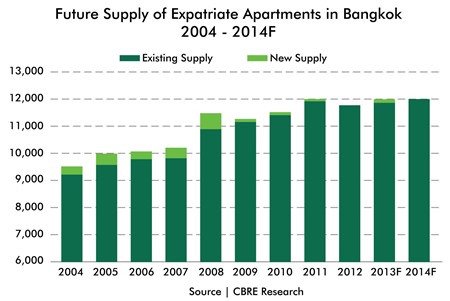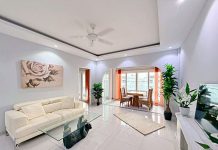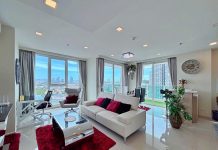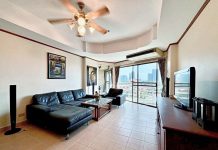Rents for expatriate standard apartments and condominiums are likely to rise for the first time in over 20 years, according to international property consultant CBRE Thailand.
“Since the early 1990’s, there has been very little increase in total amounts of rent paid by expatriates for their residential accommodation, but this looks like it is about to change,” said James Pitchon, Executive Director of CBRE Thailand who has covered the Bangkok residential leasing market for over 20 years.
The number of expatriates has been growing, but the number of two- and three-bedroom condominium and apartment units has not been growing significantly. Many expatriates are posted to Bangkok with their families. They generally want to stay in a limited number of locations; Sukhumvit Soi’s 1-63/2-42, Lumpini and parts of Silom and Sathorn. These tenants need two or three bedroom units.

There have been very few new apartments (single-ownership buildings) built and although the condominium (multi-ownership) stock in the main areas preferred by expatriates has increased by almost 80% over the last five years, the majority of that new supply has been one-bedroom units.
CBRE believes the market is almost at the stage where there is becoming a shortage or at least a limited choice of expatriate standard apartments and condominiums in the preferred locations, especially two- and three-bedroom units.
This means that for the first time in almost 20 years CBRE expects that expatriates are going to need larger lump sum housing allowances for their accommodation.
The current occupancy in the most popular expatriate areas of apartments is over 90% and 70% for condominiums from owner occupiers and tenants.
Generally most single-ownership apartment buildings have been well maintained and both the interiors and common areas have been refurbished and most can still attract tenants.
There has been less renovation of older condominium buildings which generally have larger units than new condominiums. In some older condominium developments, individual owners have not refurbished their units or replaced furniture and appliances since the day they bought the property and, in some cases, these un-refurbished properties have become so unattractive that they are unlettable even at a discounted rent.
The current low rate of rentals means that few developers are building apartments (single-ownership buildings) in expatriate areas and there are less than 100 units under construction.
CBRE estimates that there are about 22,000 condominium units under construction in expatriate areas, but only about 30% of these will be two- or three-bedroom units with the rest being studios and one-bedroom units.
There were around 65,000 expatriates with work permits in Bangkok in Q2 2013, according to the Alien Occupational Control Division of the Department of Employment. This was an increase of 10% Y-o-Y and does not include diplomats or people with work permits for locations outside of Bangkok but living in Bangkok.
Some long-term expatriates have bought property and are not potential tenants. Some expatriates are single and choose to rent a serviced apartment, a one-bedroom apartment or condominium, but a significant number of expatriates come with families or are couples who want a two- or three-bedroom unit.
“In 2012, CBRE was responsible for over 400 expatriate leasing transactions, 70% of these were for two- and three-bedroom units and we think this is representative of overall demand in the mid to upper-end of the market,” said Theerathorn Prapunpong, Director – Head of Residential Leasing Services at CBRE Thailand.
With the limited amount of good quality two- and three-bedroom existing apartment and condominium units and, with almost no new apartments and mainly one-bedroom condominium units under construction, there is likely to be a shortage of two- and three-bedroom expatriate standard residential units which is triggering an increase in rents.




